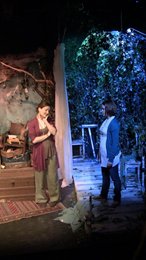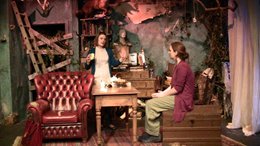My Best Friend opens up with a dialogue about time - in particular, the conundrums around whether or not you gain anything in terms of sleep by putting the clock forward for the summer. It’s a conversation most of us have had in one form or another. The two characters here, Bee and Em, end up very confused as a result. This initial tête-à-tête not only serves to forge common ground with the audience it also signals that time plays a major role in this dark, verging-on-the-psychotic comedy centred around the tensions and old wounds that emerge when three former school-friends get together under somewhat unlikely circumstances in a country house in France.
 To all intents and purposes, the organizer of this inadvertently revelatory soiree or girls'-night-in is Em (Claire Jenkins). On the surface, the buddhistic Em appears quite together. Maternal and generous, this mother of two small children lets loose more and more as the night goes on. She and Bee (Caroline O’Boyle) share the desire to give something up. In Bee’s case it’s cigarettes; Em is off alcohol. Their abstinence is their pact together. Into their cozy duoness, however, arrives the loud, strident sexual predator-like Chris, much to Bee’s surprise – but not to Em’s. Emotional fireworks ignite as memories savoury and unsavoury are rekindled. My Best Friend also finely builds up revelation after revelation as painful truths surface in the midst of wild comic mayhem.
To all intents and purposes, the organizer of this inadvertently revelatory soiree or girls'-night-in is Em (Claire Jenkins). On the surface, the buddhistic Em appears quite together. Maternal and generous, this mother of two small children lets loose more and more as the night goes on. She and Bee (Caroline O’Boyle) share the desire to give something up. In Bee’s case it’s cigarettes; Em is off alcohol. Their abstinence is their pact together. Into their cozy duoness, however, arrives the loud, strident sexual predator-like Chris, much to Bee’s surprise – but not to Em’s. Emotional fireworks ignite as memories savoury and unsavoury are rekindled. My Best Friend also finely builds up revelation after revelation as painful truths surface in the midst of wild comic mayhem.
One of the more interesting facets of how My Best Friend tells its story is the manner by which mid-sentence the characters slip from their adult selves back in time into their childhood characters to re-enact pivotal scenes from the past. To emphasise that this is a subconscious activity, in the back of the minds of the adult figures, the stage is cast in semi-darkness and O’Boyle, Jenkins and Mongey lapse into grotesque children. These transportations in time only last a short moment but they are a dramatic and traumatic interruption to the conscious scenes before us. As such, they are quite effective.
 While a lot of the drama is high energy at times, it’s played too much at one screeching pitch. Director Brendan Fox fails to reign in the very capable performances and use their energy in a more tense way. Thus it is that Jill Mongey’s Chris always seems to be shouting at the very top of her voice. She is supposed to be an annoying figure but there’s a difference between annoying and off-putting. Some of the nuances of the performances inevitably get lost in this continuously high-octane emotional tone. The end result is that rather than empathizing with the vicissitudes of the characters, one ends up feeling simply shouted at.
While a lot of the drama is high energy at times, it’s played too much at one screeching pitch. Director Brendan Fox fails to reign in the very capable performances and use their energy in a more tense way. Thus it is that Jill Mongey’s Chris always seems to be shouting at the very top of her voice. She is supposed to be an annoying figure but there’s a difference between annoying and off-putting. Some of the nuances of the performances inevitably get lost in this continuously high-octane emotional tone. The end result is that rather than empathizing with the vicissitudes of the characters, one ends up feeling simply shouted at.
In spite of this, the potential in the actors is there for all to see and My Best Friend has a charm, paradoxically, because of the honest energy of the performances and the brutal cruelty of the memories re-enacted. The set is fabulously cluttered and ramshackle in a homely, comfortable way. There may be one animal pelt too many lying around but the controlled chaos of items in the sitting room of the set mirrors the three selves portrayed. My Best Friend is entertaining. It’s just a pity that the chaos just wins out over the control in its delivery.
Patrick Brennan was chief theatre critic for the Irish Examiner from 1992 to 2004, is currently a freelance journalist, critic and lecturer and is writing a book on the theatre of Tom Murphy.